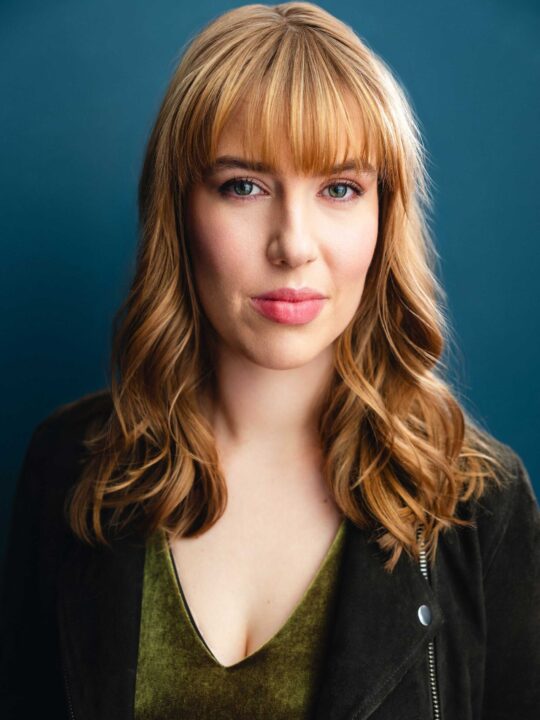Is it okay to cause harm if it means getting someone the help they need? This is the central idea writer-director-actor Danica Jensen explores in her light-hearted yet heartfelt short film, Get You Better. Based on a true story, the short follows a woman who is unable to submit her alcohol-dependent boyfriend to rehab on the technicality that he’s “not drunk enough.” The film explores the lengths we all go to in relationships to help the ones we love while battling addictions of all kinds.
In our exclusive interview, Danica Jensen (whose cinematic heroes include Taika Waititi and Mel Brooks) discusses her screenwriting process and challenges faced on set, what she hopes audiences take away from the film, her advice for indie filmmakers, and her future projects which may include the supernatural: “I do think that all stories are in some ways ghost stories.”
It’s a pleasure to meet you, Danica! I understand that this story–about someone being turned away from a rehabilitation center because they weren’t technically intoxicated at the time of admittance–was based on a true event. What was the origin of that fascinating story, and what did you find compelling to turn it into a film?
It’s a pleasure meeting you, too!
So this was a story that my mother used to tell me. She was trying to get her friend into rehab for alcoholism and they said he wasn’t “drunk enough.” My mother was understandably outraged by that response, so she sarcastically asked, “If I bring him to a bar and then bring him back, you’ll take him?” And they pretty much said, “Yes.” That line ended up in the film verbatim. She was thankfully able to persuade them to take him then and there. But I was always fascinated by that line; what would happen if she couldn’t have convinced the rehab differently?
It posed such a moral conundrum that became the central question of the film: is it okay to cause this harm if it means getting someone the help they need? It made for such a compelling story that I just started writing it down, and soon enough I realized it would make a great short film… little did I know that it would resonate with so many people who have experienced something similar.
What was your screenwriting process like? Do you have a specific method of writing that works best for you? What were your main influences and sources of inspiration while writing?
Like many writers, I’m told, I have to trick myself into writing. I’ll set a timer for 20 minutes. Even if I only get one word down on the page, I’ve done my writing for the day, that’s it, that’s all I had to do. And usually, I’ll get in a rhythm and will end up writing for longer than that. But sometimes it’s just a word or two, and so it can certainly be a slow process at times. Once I have a draft I’ll get eyes on it and get feedback from a bunch of different places. Receiving and implementing feedback, I’ve learned, is a total skill set; you have to be careful that you don’t let people tell you what they want your story to be, but I think outside feedback is so necessary and makes the process feel a bit more collaborative.
With this project, I also had a research period. I went to some open AA meetings and spoke with recovering alcoholics about their experiences with addiction generally, and with their experiences going to rehab. I wanted to figure out what the deal was with this “unofficial policy” preventing people from getting the help they were asking for… I wasn’t sure if it was a fluke or a common occurrence. It was really surprising to discover how many people had a situation similar to Wesley and Devin – I hadn’t expected that.
What ideas, themes, and messages did you want to ensure came through in telling this story on screen?
I never want to be prescriptive as a storyteller. I want audiences to be in active conversation with the film and to bring themselves and their lives to that conversation. Whatever they get from the film is uniquely theirs.
That said, this film deals with addiction, what it’s like to be in addiction as well as to love someone with addiction. And though this film deals with alcohol, it was also really important to show the addiction of love and codependency in relationships. That’s the universality that I held onto throughout the process – that we are, effectively witnessing a breakup between two people who love each other, but who cannot possibly be together.
It was also really important to me not to tell the audience how they should feel at any given moment. Sometimes you’re really on Devin’s side, sometimes you’re really on Wesley’s, and so I kept a keen focus on that balance throughout the entire process.

How did you go about assembling your crew?
I worked for two and half years as a production assistant in television, so my fellow PAs were my first call. Having that rapport and trust off the bat made the shoot go so smoothly. Everyone else came on board as a friend or friend-of-a-friend… a lot of folks I had worked with before in theatre, like our Production Designer jbroc and Costume Designer Emmy Weissman… Our DP Logan Floyd went to high school with my Co-Producer (and Co-Star!) Baldur Thor, so they reconnected and we hit it off. Logan was such a critical piece of the puzzle because I had to go off the monitor so often to perform, and I trusted him not only to set up incredible shots but to keep an eye that the story we were telling stayed on track.
What we had set out to do, and where I believe we were extremely successful, was to assemble a crew that is just really good, kind, wonderful-to-be-around people. Talented, of course, but prioritizing a set where the people are as kind as they are talented, made for the best on-set experience I’ve had to date.
Impressively, along with writing the film, you also starred in, produced, and directed it. Did the story or characters change at all from the writing through shooting it?
Oh for sure. They say you make a film three times: in writing, in production, and then in post, and this project was no exception. Once we had locations locked, little things had to change. One of the big changes that comes to mind is a scene where Wesley is supposed to have a whole dance sequence on top of the bar. The bar we went with didn’t have high enough ceilings to do that, so I had to rewrite how that whole sequence happened without losing the essence of the moment.
Then when we brought actors on set, moments changed and lines changed. Once I’ve written something and handed it over to actors, they become the experts of that character; I love to see what they want to bring to the role. The whole process of filmmaking to me is about discovery – discovering what the film wants to be – so I listen for that and as long as I’m confident in the bones of the story, I really like to find the freedom to play. And that means that things do change along the way.
I’d love to hear about your method of performance. Can you share anything about your process of preparing a character? What in your opinion makes for a great performance?
Great performances, I think, are simple and honest and oftentimes surprising. As a director, I love it when actors find something a bit unusual or not-so-obvious about a character or a moment in a scene, and as an actor, I always look for those creative moments too.
I don’t subscribe devoutly to any single methodology of acting, I trained in a variety of different methods, and to me, they are all tools to be used when the right challenge arises; you wouldn’t use a hammer to paint a house, or a paintbrush to drill holes in the wall. A great teacher once told me that your technique is only meant to be used when things aren’t clicking when you need a little help to figure something out, and so that’s always been my approach. I come from a physical theatre background, so I do tend to gravitate towards Grotowski, Laban, and Suzuki – I prepare a character through the body first and go from there.
With this project specifically, I didn’t have to do a whole lot of acting prep because of all of my directing prep and writing work. A lot of it overlapped, and I felt I knew this character better than just about any character I’d ever worked on, by spending over a year with her in the writing process.

What obstacles did you face throughout making the project? What was the hardest challenge to overcome, and what was your most unexpected breakthrough?
I mean, don’t get me wrong, producing a film is literally about solving one crisis after the next, and we had all the usual obstacles; losing locations, chasing daylight, etc… but I think it’s a huge testament to our crew that we made our days and had a really enjoyable, smooth time on set. The most stressful thing that happened was Day Zero… our Producer’s car that was supposed to transport crew members and part of our gear rental had its carburetor stolen in the middle of the night and we had to find another car… but hey, that’s why you have contingency and I’m honestly really grateful it happened before we got on set because it was pretty smooth sailing from there.
Is there any scene in particular that you are most proud of, or think back on fondly?
There’s a scene where Wesley goes into the bathroom of the dive bar, and the bathroom we shot that in was actually the men’s room of a senior living home… in other words, it was super bright and super pristine. So first thing we did top of day one was graffiti the entire bathroom with expo markers and bathtub paints and everyone on the crew pitched in – there were inside jokes all over the walls and it was such a fun way to start the shoot… I’m just so thrilled with how it looks on camera and it looks nothing like the original bathroom – I love dramatic transformations of space.
What takeaway do you hope audiences will have after watching your film?
I know that everyone’s takeaway will be unique based on their own life experiences. But of course, there’s an aspect of wanting to raise awareness about this culture of “means testing” in our social and medical programs – that is, that you have to hit a certain “rock bottom” before anyone is able or willing to help you.
Universally, though, I hope people can ask themselves what they would do in a situation like this, how far would they trudge into the moral gray area if it means saving the person they love?
What is the future of this film? Do you have any future creative projects?
We just had our World Premiere at the Provincetown International Film Festival, so right now we’re focused on the festival circuit and getting to share this story with as many folks as possible. I had intended for this to be a one-and-done short, but so far we’ve had a lot of responses hoping for this to be a feature, so we’ll see!
I do have a horror-comedy mockumentary feature in the development pipeline, that I’m hoping will be my first feature.
Let’s get to know you better Danica. Where are you from, and where do you reside?
I’m rather nomadic, I split my time between NYC, the Hudson Valley, and Provincetown, MA.
What are your favorite films, who are your filmmaking idols, and dream collaborators?
Oh, man… Beetlejuice & What We Do in The Shadows are right up there. I’m a huge fan of Taika Waititi & Edgar Wright & Mel Brooks… no surprise how the horror-comedy theme emerged in my work. I would drop everything I’m doing for the opportunity to collaborate with them!
What is one thing you’ve learned as a filmmaker that other filmmakers would benefit from knowing in starting their careers?
You need to arrive on set so prepared – more prepared than you even think you need to be – but never stuck in a fixed mindset. As much as you need a plan, you need to be able to let go of the plan. And I think that’s easier to do when you surround yourself with the right people on set.
What is one message that you would like to share with audiences about your work, your general outlook on life, that you are interested in further showcasing in your films?
All of my work in some way, shape, or form always comes back to ghosts – directly or indirectly. I am not sure what message that holds for the audience, per se; ghosts deal with invisibility and powerful forces, the past, and hauntings…. I do think that all stories are in some ways ghost stories. What I know for sure is that ghosts are something that endlessly excites me, which I guess is my message to the audience: find something that you’re endlessly excited about – dare I say obsessed with – and share it with the world.

